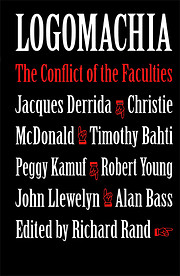

Click on a thumbnail to go to Google Books.
|
Loading... Logomachia: The Conflict of the Faculties Todayby Richard Rand, Timothy Bahti, Alan Bass, Jacques Derrida, Peggy Kamuf — 3 more, John Llewelyn, Christie McDonald, Robert Young
None No current Talk conversations about this book. No reviews no reviews | add a review
Was inspired by
What the humanities are, what they stand for, and what values they foster or disclaim are no longer cozy academic issues: they are under attack everywhere in legislative assemblies and the national press. The crisis is now especially intense but it is not exactly new. In 1798 Immanuel Kant published Der Streit der Fakultäten (The Conflict of the Faculties), a remarkable little book that has been credited with shaping the liberal arts program in modern European universities. Discussing the role and status of the higher faculties (theology, law, and medicine) relative to the lower faculties (philosophy, mathematics, history, philology, geography), Kant established their functions as faculties of freedom on one side and of property on the other. Kant's book, so long neglected by all but the most devoted specialists, can no longer be ignored. It serves as the basis for these essays by distinguished scholars who have themselves been deeply involved in the intellectual conflicts of contemporary education in Europe and America—Timothy Bahti, Alan Bass, Jacques Derrida, Peggy Kamuf, John Llewelyn, Christie McDonald, and Robert Young. This volume will attract a hive of controversy but much honey, too. It confronts issues central to university ideals: the teaching of values, the role of philosophy and literary studies in their sister disciplines (especially history), the precarious balance between research and teaching, the defense of intellectual autonomy, and the public responsibility of the university. No library descriptions found. |
Current DiscussionsNone
 Google Books — Loading... Google Books — Loading...GenresMelvil Decimal System (DDC)378.001Social sciences Education Higher education (Tertiary education)LC ClassificationRatingAverage: No ratings.Is this you?Become a LibraryThing Author. |
||||||||||||||||||||||||||||||||||||||||||||||||||||||||||||||||||||||||||||||||||||||||||||||||||||